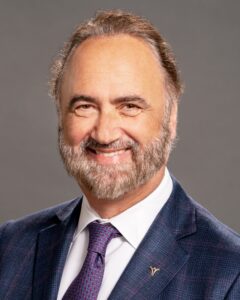When it comes to building a great culture, Theo Theodosiou has some radical ideas.
He believes “it’s not that hard” – that is, “if you’re determined and consistent.”
The problem is that culture has taken a backseat in healthcare. “Most of the change and transformation has arrived at the doorstep of the industry. It has not been initiated with intentionality.”
And it’s time for that to change, he said during a recent Keynote with Bill Russell, Founder of This Week Health. At theo Transformation Advisory, which Theodosiou founded 22 years ago, the goal is to “guide good leaders and worthy organizations on the path to becoming true enterprises” and “defining organizations.”

Theo Theodosiou
Of course, it’s not an easy lift, but he believes it’s possible if leaders are willing to adopt a new way of thinking and abandon the strategies that aren’t producing results.
The benefits of sponsorship
In a traditional relationship between a leader and the organization, “leaders are engaged to bring their talents to the organization, bring their competencies, align those competencies with the organization, and make a contribution,” Theodosiou said. A sponsorship relationship, on the other hand, is one in which “the organization will enable you to grow, anticipate your needs, and ensure that you have everything you need to be successful.”
As roles continue to evolve, he believes a new approach is needed to ensure CIOs and other leaders receive the guidance and support they need. With a sponsor who is “here to ensure success,” leaders are more receptive to both criticism and advice, and are less likely to feel isolated.
It’s quite a departure from the more traditional performance-driven model, which “does not create safety,” Theodosiou noted. “It creates tension. It creates anxiety.” It also creates a paradox in which previous successes can inflate expectations to the point that it feels like a “punishment,” whereas sponsorship has the adverse effect. “Not only can it be an accelerator to contribution; but it’s also a fantastic retention mechanism because people who feel sponsored are not as inclined to surrender the opportunities they have.”
Leaders, not just executives
It’s a theory Theodosiou has witnessed, he said, citing a colleague – Mary Ann Thode, former President of the Northern California region of Kaiser Permanente – who made a point of showing job postings from other organizations to her staff. Despite the risk it carried, Thode continued to make her team aware of opportunities so that they never felt stuck. The result? A foundation of loyalty and trust and a team that no one wanted to leave.
As this type of act demonstrates, the true objective of sponsorship is to provide guidance “beyond the boundaries of the organization,” even if it means sustaining a short-term loss. It’s the difference between executives and leaders, according to Theodosiou. Whereas executives tend to “associate service with their own tenure,” leaders are focused on “shaping an environment that will make a difference for years to come,” he said. “We need more leaders.”
Rebuilding culture
Even the most successful culture, however, can erode over time – or simply collapse due to ineffective leadership. The solution? “Hit the reset button and redefine the values,” he said, which is much more impactful than “trying to revive something that has lost its energy.”
The best place to start with a reset? By obtaining feedback – a lot of it. In fact, one of theo Transformation Advisory’s clients surveyed more than 4,000 individuals, asking basic (yet critical) questions such as, “What’s important to you,” “Why did you join this organization,” and “Why are you still here.”
The answers can be very telling, said Theodosiou, who advised leaders to take the data and analyze it to identify “consistent sources of meaningful behavior that attach themselves to the purpose.” Doing so can help construct a new vision that’s reflective of the values and perspectives of those who make up the organization, he added.
“Enterprise” thinking
Another important component Theodosiou discussed was what sets certain organizations apart from the rest. “I don’t believe that every organization is extraordinary,” he noted. “But the ones that are can have a defining impact on society and their sectors.”
What’s often stopping them is too much emphasis on sustainability, which focuses largely on “holding on to your present prosperity,” he said. “True enterprises recognize that today’s prosperity was invented five years ago. Where will your prosperity come from five years from now? What impact will you be making?”
One of the organizations he worked with took these words to heart, and was able to establish itself as a top player in the competitive academic space and become distinguished in its disease category – something that hadn’t even been a goal before.
“If you wish to be a sustainable organization, stick to your knitting. Stay close to your primary market,” Theodosiou said. The team in question, however, didn’t do that. Instead, “they conceptualized themselves as an enterprise,” which opened the door to new possibilities. “You have to have leaders who believe they're there to do more than oversee performance,” he said. “You have to have a culture that is embedded in the values and the purpose. And then, you have enterprise opportunities.”
Thirsty beasts
The challenge can come when there are too many opportunities to pursue, noted Theodosiou, who believes one of the biggest enemies facing CIOs isn’t a lack of resources, but rather, an abundance of priorities.
His suggestion? Implementing a policy like System-wide Priorities on Target (SPOT) that enables teams to push certain objectives to the top of the queue and push initiatives through.
“Obviously, you have to be very thoughtful as to what are those few non-negotiable things that are the building blocks for the future,” he said. “But it’s been very well received because it is the direct means of actually reconciling the many things that we do to tend today, versus the things we’re going to ensure the organization's future and impact.”
It represents a new way of thinking that he urged CIOs to adopt in order to advance their organizations. In fact, he believes failing to do so will hinder their progress – both individually and as a health system.
“If you’re part of an organization where, for three years in a row, the investment in infrastructure and technology has not become a SPOT, examine your options, because you’re investing your best energies in an uphill battle,” Theodosiou said.
Organizations in today’s landscape, he added, are “thirsty beasts. But if they drink everything they have now, there will be nothing left. There’s no future.”
But with the right processes in place and an intentional culture that “guides behavior, collects energies and resources, marshals them, and aims them at creating value,” there can be one.


Questions about the Podcast?
Contact us with any questions, requests, or comments about the show. We love hearing your feedback.

© Copyright 2024 Health Lyrics All rights reserved